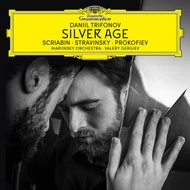180g 4LP From Russian Pianist Daniil Trifonov!
This item not eligible for any further discount offers!
Daniil Trifonov's latest album, recorded with Valery Gergiev and the Mariinsky Orchestra, recalls a time when Russian musicians, poets, visual artists, dramatists and performers were among the most original in the world. Silver Age illustrates the artistic boldness and brilliance of a turbulent era in the country with works by its most avant-garde composers.
Trifonov plays Scriabin's Piano Concerto in F sharp minor op.20, Prokofiev's Piano Concerto No. 2 in G minor op.16 and Stravinsky's Trois Mouvements de Pétrouchka. There are also Stravinsky's Sérénade and excerpts from L'Oiseau de feu (arranged for piano by Guido Agosti) as well as Prokofiev's Sarcasmes op. 17, the piano sonata No. 8 in B flat major op. 84 and the "Gavotte" from Three Pieces from "Cinderella" Op. 95 No. 2.
It was the impresario Sergei Diaghilew, the founder of the Ballets Russes and an important art advocate in his country, who staged Scriabin's piano concerto as part of his "Concerts historiques russes" in Paris in the spring of 1907. Not without reason: "Rachmaninov and Scriabin represented the young generation of Russian composers at the turn of the 20th century," explains Trifonov, "but if you see Rachmaninov as a composer who looked longingly to the horizon, then Scriabin was the one who saw them World behind it."
It was also Diaghilev who soon after commissioned a young artist practically unknown outside of St. Petersburg: he had Igor Stravinsky write a work for the Ballets Russes. L'Oiseau de feu became a sensation of the 1910 season. Together with Pétrouchka (1911) and Le Sacre du printemps (1913), the piece Stravinsky secured a place among the most influential composers of the beginning secular. In the spirit of the Silver Age, he was to research and develop new styles throughout his long life.
"Stravinsky was in a sense an anti-romantic - the second movement, Romanza, the Sérénade dedicated to his wife couldn't be more unsentimental," explains Trifonov. "Stravinsky was versatile like a chameleon. From his Russian style to neoclassicism and his later experiments with serial music, jazz, and much more, it is music that was written in playful abstraction. The composer's personal feelings remain hidden, but his artistic signature is always unmistakable."
The pianist's program captures the future-oriented, rule-disregarding energy of groundbreaking works by three unusually skilled composers. It also shows how typical elements of the Silver Age, such as irony and an interest in folk culture or ideas from the past, emerge in Prokofiev's later compositions, for example in his music for Cinderella and the Piano Sonata No. 8, Works of the Ripe Period, in which he once again pursues the musical ideals that once established his reputation as an iconoclasting young composer and pianist.
Above all, Trifonov's selection captures the creative diversity of this brief but explosive cultural moment. "Scriabin," says Trifonov, "wanted to summarize all aesthetic experience in a single, mystical, musical vision; Stravinsky united the arts by radically redefining ballet; and Prokofiev turned to film as the complete, most modern connection of the senses." The Russian Silver Age paved the way for future artistic developments, and its spirit is rightly celebrated in this new recording.
Features
- 180g 4LP
- Gatefold
- Made in Germany
Musicians
| Daniil Trifonov | piano |
|---|---|
| Mariinsky Orchestra | |
| Valery Gergiev | conductor |



 Turntable Accessories
Turntable Accessories Headphone Accessories
Headphone Accessories Cable Accessories
Cable Accessories Vinyl Accessories
Vinyl Accessories Compact Disc Accessories
Compact Disc Accessories







